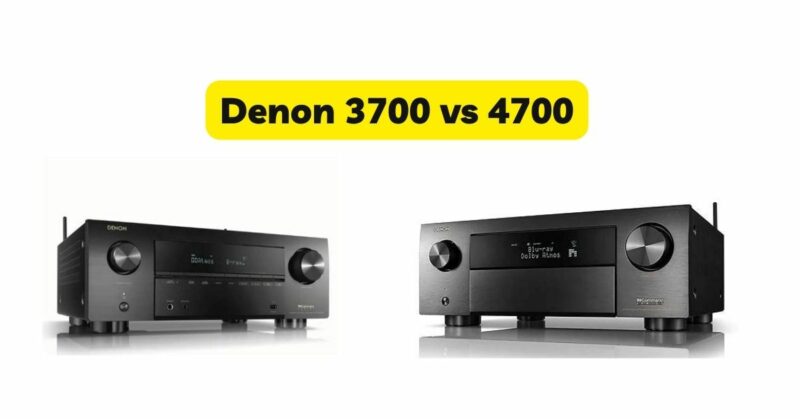Denon is a renowned brand in the audio industry, known for its high-quality AV receivers that deliver exceptional sound performance. In this article, we will compare two popular models from Denon’s lineup: the Denon AVC-X3700H and the Denon AVR-X4700H. These AV receivers offer advanced features, versatile connectivity options, and immersive sound experiences. By examining their specifications, differences, and strengths, we aim to help you make an informed decision when choosing the ideal AV receiver for your home theater setup.
Denon AVC-X3700H :
The Denon AVC-X3700H is a feature-packed AV receiver designed to provide immersive sound and a high-quality audio experience. With its 9.2-channel configuration, the AVC-X3700H offers flexibility in speaker placement and supports advanced audio formats like Dolby Atmos and DTS:X, creating a three-dimensional soundstage.
The AVC-X3700H features high-quality amplification, delivering 105 watts per channel, ensuring powerful and detailed sound reproduction. It incorporates advanced audio processing technologies, including Denon’s AL32 Processing Plus and Audyssey MultEQ XT32, which optimize the audio performance and provide room correction for accurate sound reproduction.
Connectivity options on the AVC-X3700H are extensive, with multiple HDMI inputs and outputs, including one HDMI input on the front panel for easy access. The receiver supports 4K Ultra HD video, HDR (High Dynamic Range), and HDCP 2.3, ensuring compatibility with the latest video standards. It also features eARC (Enhanced Audio Return Channel) support, enabling high-quality audio transmission from compatible TVs.
Denon AVR-X4700H :
The Denon AVR-X4700H is a powerful AV receiver that offers exceptional audio performance and advanced features. With its 9.2-channel configuration, the AVR-X4700H provides a versatile sound experience and supports popular audio formats like Dolby Atmos and DTS:X.
The AVR-X4700H incorporates high-quality amplification, delivering 125 watts per channel, ensuring dynamic and detailed sound reproduction. It features advanced audio processing technologies, including Denon’s AL32 Processing Plus and Audyssey MultEQ XT32, which optimize the audio performance and provide precise room correction for accurate sound reproduction.
Connectivity options on the AVR-X4700H are comprehensive, with multiple HDMI inputs and outputs, including one HDMI input on the front panel. The receiver supports 4K Ultra HD video, HDR (High Dynamic Range), and HDCP 2.3, ensuring compatibility with the latest video standards. It also features eARC support, enabling high-quality audio transmission from compatible TVs.
Comparison and Performance:
When comparing the Denon AVC-X3700H and the AVR-X4700H, both receivers offer similar 9.2-channel configurations, advanced audio processing technologies, and versatile connectivity options. However, there are notable differences between the two models.
One of the significant differences lies in the power output. The AVR-X4700H delivers 125 watts per channel, whereas the AVC-X3700H provides 105 watts per channel. This difference in power can result in a more dynamic and impactful sound performance, especially in larger rooms or with demanding speakers.
Another significant difference is the inclusion of additional features in the AVR-X4700H. It offers a more advanced video processing capability with features like upscaling, video conversion, and ISF video calibration. These features allow for enhanced video performance and professional calibration, providing the best possible visual experience. Additionally, the AVR-X4700H has a more comprehensive set of analog audio inputs, which can be beneficial if you have legacy audio equipment.
Both receivers support the latest audio and video standards, including Dolby Atmos, DTS:X, 4K Ultra HD, HDR, and HDCP 2.3. They also feature eARC support for high-quality audio transmission from compatible TVs.
Conclusion:
Choosing between the Denon AVC-X3700H and the AVR-X4700H depends on your specific requirements, room size, and budget. The AVR-X4700H offers a slight advantage in power output, advanced video processing capabilities, and additional analog audio inputs, making it suitable for larger rooms and users who prioritize the highest level of audio and video performance. On the other hand, the AVC-X3700H provides exceptional audio performance, versatile connectivity options, and an attractive price point. Consider your needs, room size, and preferences to select the AV receiver that best fits your requirements, knowing that both models offer outstanding audio quality and features for an immersive home theater experience.


